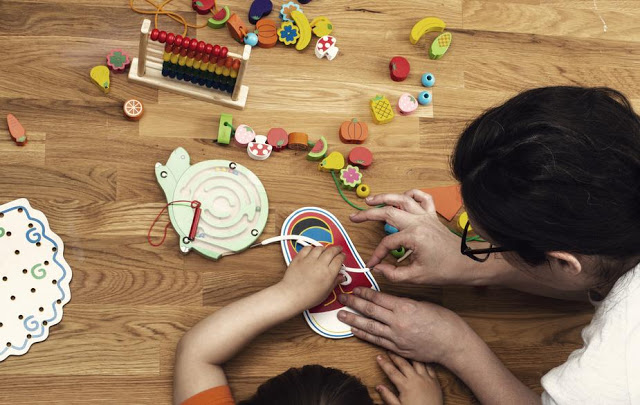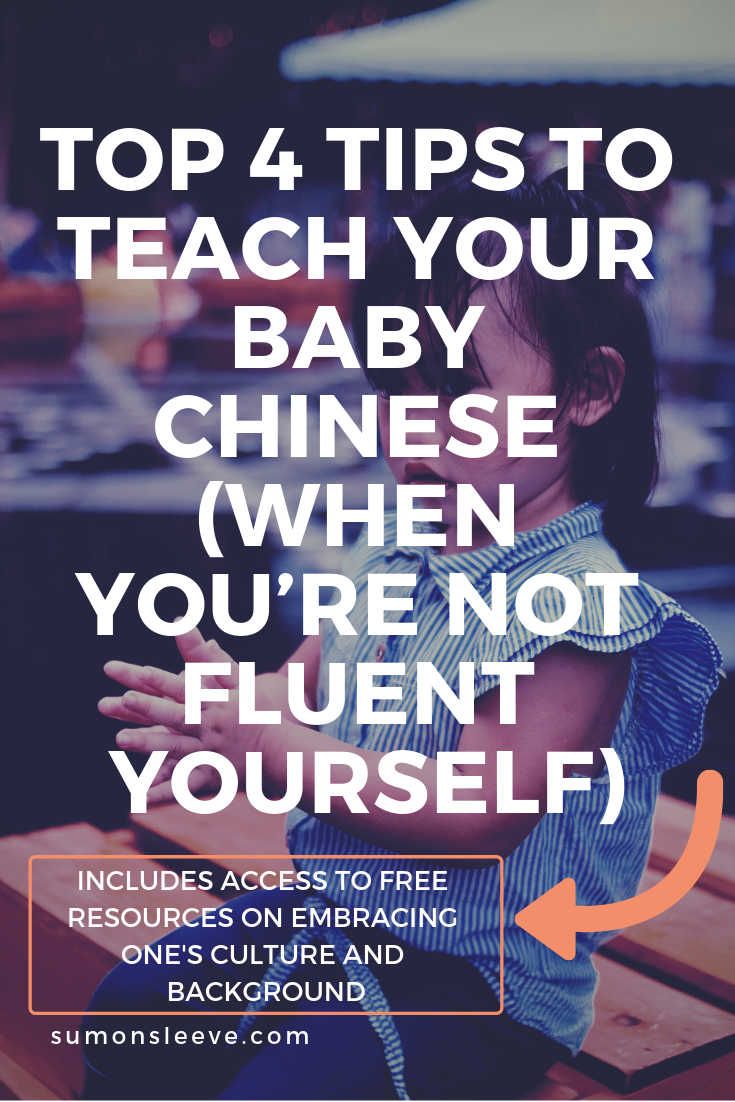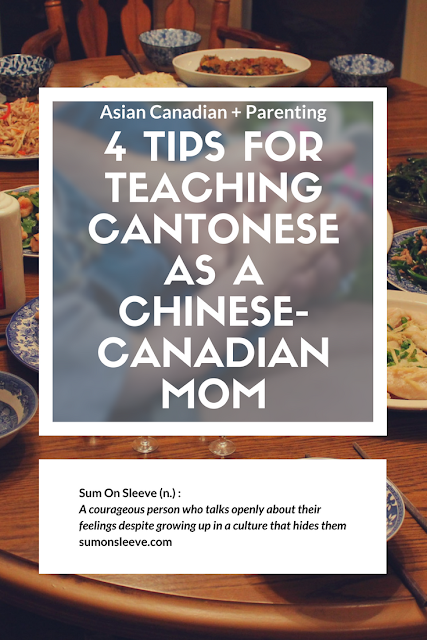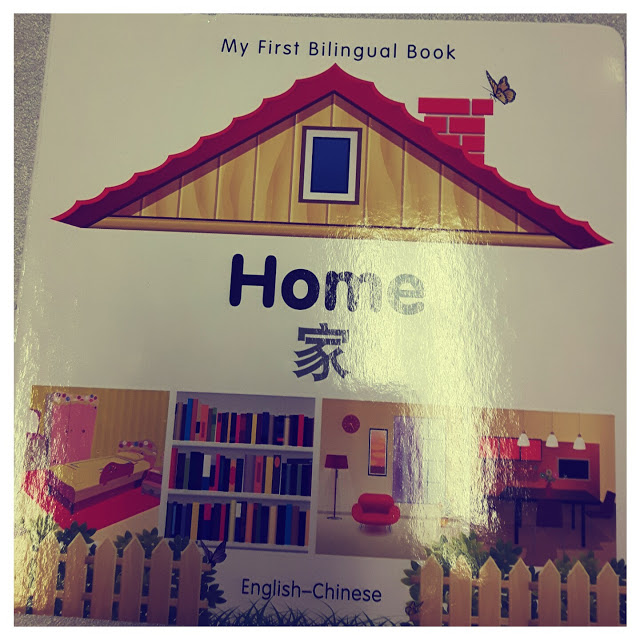
I’m not super fluent in Chinese but I want to preserve the language for my daughter. Here are my top 4 tips for doing this
I’m a Chinese-Canadian mom (you can read more about my journey of accepting my culture here).
As much as I’ve been open to learning and adopting the Chinese way of doing things, it’s been hard balancing what I think is important to preserve in my family versus “I’ll just do it the Canadian way.”
There are some Chinese practices that I just don’t embrace.
For instance, my daughter should not wear white, blue or black hair accessories because of a Chinese superstition that it’s associated with bad luck/death.
Okay, those clips/hair ties go missing all the time so I get them in bulk and there are a bunch of blue, black and white ones. I’m not going to waste half the package because of a silly belief.
But mainly, I believe bad luck is a necessary component of life; it makes me adapt, becoming more resilient with whatever life throws at me.
I can’t control these things and it’s better that I accept that I can’t control them because then when shitty things happen, I don’t live in regret, thinking I could have somehow prevented it from happening (you know, like by more wearing red).
So I sweep the floor and wash my hair during Chinese New Year. I included 4 tips in this blog instead of 8 (For those who don’t know, 4 is an unlucky number as it sounds similar to death in Chinese and 8 is a lucky number because it rhymes with fortune).

So far in my life, I think my luck’s been pretty good. I also didn’t shave my daughter’s hair at 1 month for luck and she’s got a pretty sweet life.
Although there are some Chinese traditions that I don’t accept, the language is something I definitely want to preserve.
Ultimately, I want her to be able to understand Cantonese so that if someone talks shit about her in her presence, she knows what they’re saying.
I’ve been told I don’t look Chinese so there have been many incidences where I’m at a store or restaurant and I hear strangers talking about me in Cantonese, assuming I don’t know what they’re saying.
When I turn to them and begin contributing to their conversation, the look on their faces gives me so much joy.
I want her to experience that joy!
My hands are clasped together doing Mr. Burns “excellent” while I’m thinking about that moment.
I only speak Cantonese to my daughter because I know once she starts school, she’s going to absorb the English language like a sponge.
When I started this, I realized there are many things I have absolutely no idea what they are in Chinese.
Thank goodness for Google translate.
Why does strawberry have the grass character in the Chinese translation? I always thought it was “see dor beh lay.” I guess grass is kind of like straw? Blargh I digress.
I started Chinese school when I was 7. Even though I spent my Saturday mornings every year for 12 years to learn the language, speaking, reading and writing Chinese isn’t exactly my forte.
After finishing Chinese school, there weren’t really any opportunities to write or read Chinese. I write in English and I read in English.
There are the occasional times when I order food at a Chinese restaurant and need to go through millions of menu items.
When I moved out of my parents’ home, I rarely spoke Chinese to anyone, except the times where I’m hanging out with a Chinese friend or my sister and things come up that I don’t have English words for.
So becoming a mom and trying to preserve the Chinese language hasn’t been easy for me; however, it’s something I truly value and I’m determined to keep it up.

Here are some of my tips for anyone who struggles with this as well:
1. Vocabulary
When I was pregnant, I had this expectation where I was going to have constant one-way conversations in Cantonese with my baby once she was born (you know, narrating whatever I’m doing and talking to her non-stop).
But that obviously did not happen.
For the first 6 months, most of my vocabulary consisted of the following words (sleep deprivation makes it hard to learn new words):
- Choi Lai (her Chinese name)
- Woon
peen peen (change diaper) - Fun
gow gow joo (sleepy time) - Yum
lai lai (drink milk) - Mah mee (mommy)
- Deh dee (daddy)
- Sor
joo jai (silly piggy) Yow mo see? (Are you okay?…mainly when she cries and I’m comforting her)- Nay ho dut yee
ahhhh (you’re so cute) - Nay jee oom jee
ahhhh (did you know that? This usually comes after a stated observation like “nay ho dut yeeahhhh “) - Gong Gong Por Por (maternal grandpa and grandma)
- Yeh Yeh Mah Mah (paternal grandpa and grandma)
As she got older and as her needs changed, my vocabulary expanded to body parts, household items, playground stuff etc.
Because I’ve reiterated these words incessantly, she actually knows what I’m saying.
She’ll point to her bottle when I ask her if she wants to “yum
I think starting with the basics and having a simple list of words helped me focus. I changed my original expectation so that I wasn’t hard on myself when I didn’t know the correct word. It helped me control my google translate use as it only increased when my vocabulary grew.
2. YouTube Karaoke
Cantonese Children’s songs are hard for me to sing because I never learned them as a kid. I learned them in English so it’s just natural for me to remember those words to sing when in a sleep-deprived state.
I grew up with Twinkle Twinkle not “
But I did grow up listening to 90’s Hong Kong pop music, specifically the Four Heavenly Kings.
I was in love with Aaron Kwok as a kid (I even had a massive cloth poster of him hanging above my bed once upon a time).
I know he got married recently but I believe we were meant to be in another life (hey, a girl can dream).
Now as an adult, my husband has influenced me to appreciate Jacky Cheung’s voice. He may not be the best looking one out of the Four but his voice is damn good.
So pretty much every night for the last few months, we would sing one of Jacky’s hits as a family. It’s been Everlasting Love on repeat for the last month or so.
My husband’s Chinese isn’t as great as mine but his voice is better. Some have even told him his voice has boyband potential.
My daughter loves it when we sing together. She’ll start dancing, moving her arms, rolling her shoulders and shaking her hips.
We tend to say “Nay ho dut yee
It’s a fun family activity. Old MacDonald can wait.
Anyway, YouTube has a ton of these and they provide you with Chinese subtitles and English pinyin if you don’t know how to read the words.
Plus, once you’ve sung the song several times on repeat, you don’t even need them. Reading the characters on the screen makes me remember my good old Chinese school days.
I’ve come to realize that I actually know more words than just Chinese food menu items.
3. Books
One word: Amazon
The book below is literally the first thing I ever bought on Amazon (yes, I’m a laggard). I had to create an account and everything.
I’ve also bought a couple of books at a Chinese bookstore and I’ve seen some good ones at the local library. I just haven’t gotten around to renewing my library card.
Also, if you have relatives who are coming in from Asia, you can ask them to get your books. I should have done that before my aunt came to visit but next time I will.
We live in a world where everything is at our fingertips so I’m leveraging off this digital world to preserve the Chinese language as a Chinese-Canadian mom.

4. I don’t actually have a 4th tip.
I’m testing my luck here haha.
Whatever happens, happens. I’m out (mic drop).




